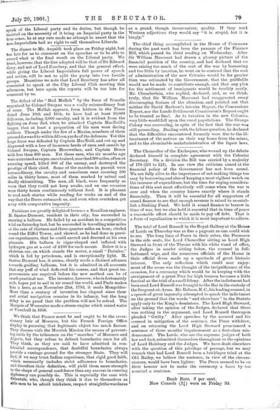The chief thing accomplished in the House of Commons during
the past week has been the passage of the Finance Bill, which passed its third reading on Wednesday. After Sir William Harcourt had drawn a gloomy picture of the financial position of the country, and had declared that we were raising too much of the cost of the war by borrowing and too little by taxation, he went on to contend that the cost of administration of the new Colonies would be far greater than was estimated by the Government, that the goldfields would not be made to contribute enough, and that any plan for the settlement of immigrants would be terribly costly. Mr. Chamberlain, who replied, declared, and, as we think, truly, that Sir William Harcourt had exaggerated every discouraging feature of the situation, and pointed out that neither Sir David Barbour's interim Report, the Concessions Report, nor the Lands Settlement Commission's Report ought to be treated as finaL As to taxation in the new Colonies, very little would fall upon the rural populations. The Orange Colony was recovering, in spite of the fact that the war was still proceeding. Dealing with the labour question, he declared that the difficulties encountered formerly were due to the ill- treatment of the natives on their way home from the mines, and to the abominable maladministration of the liquor laws.


































 Previous page
Previous page